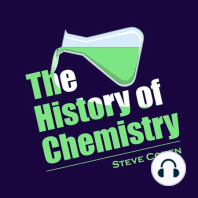17 min listen
67: Let's Scratch the Surface
ratings:
Length:
23 minutes
Released:
May 8, 2023
Format:
Podcast episode
Description
In this episode we encounter for the first time early chemistry of surfaces, including the problem of how to separate the effects of a surface versus the rest of a chunk of material. Pliny the Elder first talked of surface effects, and Benjamin Franklin did some experiments in London. We hear of 19th-century Anne Pockels and her apparatus to measure surface effects of soap in water. Then we learn of Irving Langmuir's extensive work on molecules on liquid surfaces in the 1920s, and how Katharine Blodgett extended his research. The 1930s saw the development of the electron microscope which could resolve images better than light, and Erwin Müller in 1955 first imaged individual atoms on crystal surfaces with a field-ion microscope. By the 1960s engineering improved to attain ultra-high vacuums to keep surfaces from air contamination.Support the show Support my podcast at https://www.patreon.com/thehistoryofchemistry Tell me how your life relates to chemistry! E-mail me at steve@historyofchem.com Get my book, O Mg! How Chemistry Came to Be, from World Scientific Publishing, https://www.worldscientific.com/worldscibooks/10.1142/12670#t=aboutBook
Released:
May 8, 2023
Format:
Podcast episode
Titles in the series (100)
2: All Fired Up by The History of Chemistry
